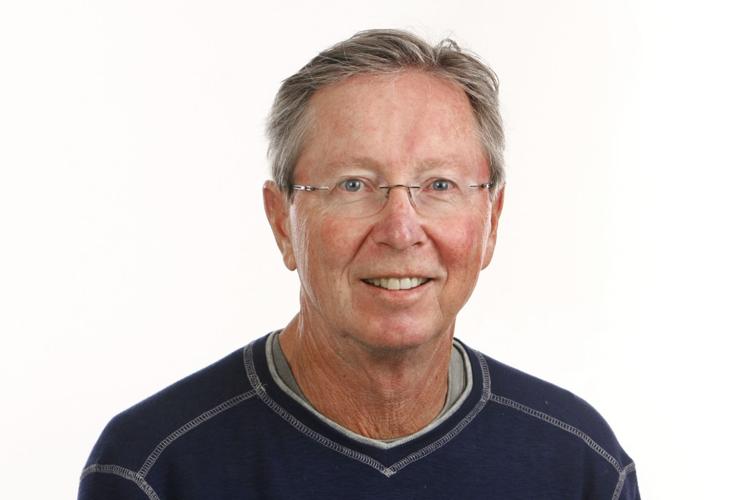At various times in his bountiful and enterprising life, Burt Kinerk has been a baseball guy, a football guy, a basketball guy, a golf guy, a horse racing guy, a fishing guy, a hunting guy and a man so immersed in sports that you wonder how he had time to be an attorney, the father of four kids, happily married to Nancy Kinerk for 57 years.
You marvel that the son of a dry cleaner found a way to be part of the United Way, the Junior League and a member of the board of directors of the Kino Learning Center.

Burt Kinerk
He became an airplane pilot.
He helped to found the Copper Bowl.
He pitched a no-hitter against Bisbee High School and played on the winning team, Tucson High, in the 1952 state championship baseball game.
He developed a horse that raced in the 1996 Kentucky Derby.
Once, at the Tucson Open, he was tasked with getting Bob Hope from the golf course to the airport and to keep him entertained during a three-hour delay.
“I ended up telling jokes to Bob Hope,” he says now, chuckling at the memory. “I had him laughing.”
Kinerk has touched every aspect of sports in Tucson and beyond.
He was Sean Elliott’s agent. He represented Tedy Bruschi. One of his recent golf foursomes included Terry Francona. When Chuck Cecil moved back to Tucson, he lived in Kinerk’s guest house.
If there is a Mount Rushmore of Tucson sports history, it wouldn’t be a stretch to see Kinerk on the landscape with Lute Olson, Pop McKale and Hi Corbett.
But when Kinerk is honored Saturday with the Jim Click Spirit of the Community award at the Arizona Bowl, it won’t be the case of a high roller using his influence to get a day in the spotlight.
It’s more like: What took so long?
True, he represented the titans of UA sports like Olson, Elliott, Bruschi, Michael Bates and Larry Smith, but did you know he found time to help Pima College’s 7-foot basketball star Horacio Llamas get to the NBA?
Or that he has put his soul behind sustaining horse racing at Rillito Downs? Or that when the Conquistadores needed someone to escort Lee Trevino to the airport after he won the 1971 Tucson Open — and to keep the sacred Conquistadores helmet safe — it was Kinerk who told Trevino to get in the car and hold onto that trophy for dear life.
Kinerk inherited sports genes from his father, Dan Kinerk Jr., who moved to Tucson from San Francisco in the 1920s and soon became owner and proprietor of Varsity Cleaners, an enduring establishment near UA’s Main Gate Square.
Not only did Dan Kinerk regularly clean UA sports uniforms, he did laundry for the Hollywood industry while they were churning out John Wayne movies at Old Tucson.
But it wasn’t John Wayne who turned Dan Kinerk’s head as much as baseball All-Star Lefty O’Doul, a friend from Kinerk’s early days in San Francisco.
“Lefty and his teammates signed a baseball from the (1933) World Series and presented it to my dad,” Burt remembers. “One day when I was 12 and all the guys got together, we couldn’t find a baseball.”
You can almost guess what came next: a bunch of 1940s kids persuaded young Burt Kinerk to use the prized World Series baseball for their afternoon pick-up game.
“I’ve still go the ball,” says Kinerk. “And some of the names are still clear enough to read.”
After he played baseball at Arizona, spent two years of military service, earned a law degree at the UA and was hired by the Tucson firm of Robertson, Childers, Burke and Drachman, Kinerk began a career of community service in his hometown.
Kinerk has represented PGA Tour golfers Rory Sabbatini, Ricky Barnes, Ronnie Black and even an ex-Sun Devil, Dan Forsman. He was at the 1992 Barcelona Olympics where his client, Arizona All-American swimmer Crissy Ahmann Perham, won a gold medal.
A year earlier, a thoroughbred — Festin — an unknown Argentine horse Kinerk bought for $18,000, led the world with more than $2.1 million in earnings, and was a favorite at the Breeder’s Cup Classic.
Five years later, Festin’s son, Corker, was in the Kentucky Derby.
How’s that for one man’s career? Olympic swimming. The Kentucky Derby. The PGA Tour. The NBA and the NFL.
What makes the Arizona Bowl’s Spirit of the Community award so meaningful is that Kinerk and partners Merle Miller and Larry Brown fought to get a bowl game in from 1981-87, never giving up, persistent, until the NCAA in 1988 granted Tucson the Copper Bowl.
For the next 11 years, the Copper Bowl included the Oklahoma Sooners, Wisconsin Badgers, BYU Cougars and a handful of some top names in college football. Kinerk’s inexhaustible spirit came into play one November night, 1992, when he hoped to be the first to invite an 8-3 Washington State team to play opposite Utah in the ’92 Copper Bowl.
“Obviously, we didn’t have cellphones in those days and I couldn’t reach anybody at the stadium as Washington State was beating Washington in the Apple Cup,” Kinerk says. “So I called the fire department in Pullman, told them the situation, and asked if they could go to the stadium and get Jim Livengood on the phone.”
Ten or 20 minutes later, the Washington State athletic director phoned Kinerk and accepted a bid to the Copper Bowl, which WSU won to finish 9-3, ranked No. 15, then the highest in school history.
Ultimately, Livengood became Arizona’s athletic director. He and Kinerk became the closest of friends, a union that endures today.
Sometimes it has been a small world.
When Amphitheater High School’s all-star running back Jon Volpe graduated from Stanford — Volpe led the Pac-10 with 1,027 yards — Kinerk helped him get a berth with the Canadian League’s British Columbia Lions, and later the Pittsburgh Steelers.
Now it is Volpe, CEO of Nova Home Loans, who is the corporate sponsor of the Arizona Bowl. On Saturday, they’ll be reunited at Arizona Stadium.
Small world, indeed.






